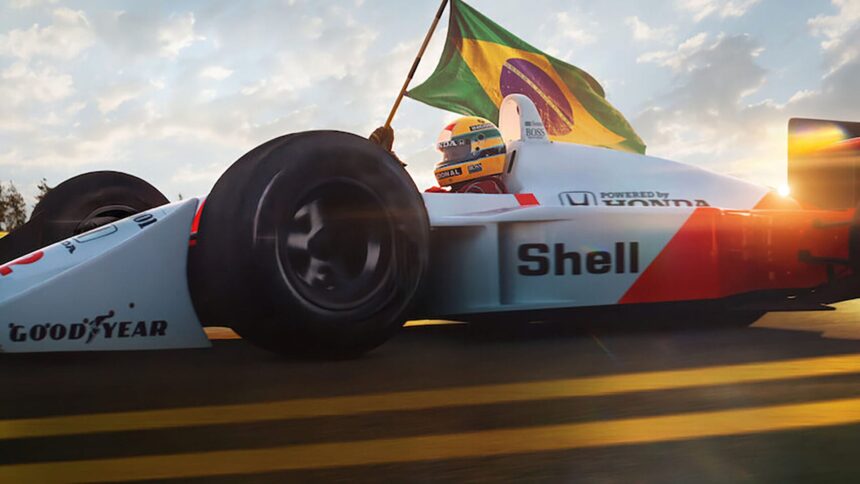“Senna” is a Netflix biographical miniseries starring Gabriel Leone about Ayrton Senna‘s life.
“Senna” roars onto screens with the intensity of a Formula 1 engine, presenting a high-speed journey through the life of Brazilian racing legend Ayrton Senna. This miniseries, while undoubtedly a tribute to the three-time world champion, manages to capture the essence of Senna’s racing spirit without veering into overly sentimental territory.
From the opening scenes, it’s clear that “Senna” is first and foremost a series about racing. The producers have wisely chosen to make the track sequences the centerpiece of their narrative. These scenes are a testament to the production team’s skill, featuring dynamic camera work, rapid cuts, and a palpable sense of speed that will leave viewers gripping their armrests. The sound design deserves particular praise, with the roar of engines and screech of tires adding an extra layer of authenticity to the experience.
While the racing sequences are undoubtedly the highlight, the series doesn’t neglect Senna’s career progression. It offers a chronological journey through his rise to fame, from his early days to his championship victories with McLaren. However, those looking for deep insights into Senna’s personal life may find the series lacking. “Senna” firmly keeps its focus on the track, presenting Senna more as a racing icon than a complex individual.
The portrayal of Senna himself is respectful, bordering on reverential. The series paints him as a fierce competitor with an aggressive driving style that revolutionized the sport. While this approach certainly captures Senna’s public persona, it sometimes feels like a missed opportunity to explore the man behind the helmet. The dramatic elements of the series are its weakest link, often falling into the trap of hero worship rather than offering a nuanced character study.
Technically, “Senna” is a triumph. The cinematography during the racing scenes is particularly impressive, with clever use of angles and perspectives that put viewers right in the driver’s seat. The editing is sharp and kinetic, matching the pace of the sport it depicts. However, these same techniques can sometimes feel overwhelming in the non-racing segments, creating a sense of restlessness that may not suit the quieter moments of Senna’s story.
Despite its strengths, “Senna” isn’t without flaws. Its determination to focus on Senna’s racing career sometimes comes at the expense of narrative depth. The series skims over potential areas of conflict or controversy, presenting a somewhat sanitized version of events. This approach may satisfy die-hard Senna fans but could leave more critical viewers wanting a more balanced perspective.
“Senna” succeeds more as a celebration of Formula 1 racing than as a comprehensive biopic. It’s a high-octane ride that captures the thrill of the sport and the charisma of one of its greatest stars. While it may not break new ground in terms of storytelling or character development, it certainly delivers on its promise of speed and spectacle. For racing enthusiasts and Senna admirers, it’s a must-watch. For others, it offers an exciting, if somewhat surface-level, glimpse into the world of Formula 1 during one of its most iconic eras.
Where to Watch “Senna”

